Most astrophysicists would agree that it's highly likely that there's life beyond Earth. But then why haven't we found any? This month on Naked Astronomy, Graihagh Jackson tackles one of the fundamental questions of mankind with Neil deGrasse Tyson, Jim Al-Khalili and Dallas Campbell.
In this episode
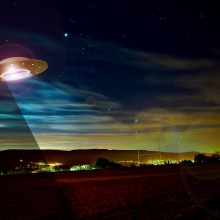
00:53 - Flying saucers and UFOs
Flying saucers and UFOs
with Dallas Campbell, Science Broadcaster & Journalist
Roswell High, Area 51 and Rendlesham Forest; there are all places were aliens have been 'seen.' Much mystery and suspicion remains around these sightings, even 50 years later. Dallas Campbell phones home to describe the many UFO conspiracy theories and speculate why they remain such an enigma, even today...
Dallas - You're out walking the dog. It's late afternoon and getting dark. In the sky you see a bright light. Is it moving - you think so? You try and think what it might be starting with the most likely: aircraft landing lights, venus, foil balloon reflecting the light, iridium satellite flare, could it simply be floaters in your eye. You're close to the nearby military base, perhaps it's an exotic aircraft or one of those drones we hear so much about these days.
Suddenly it dawns on you. Of course, it must be an alien scout craft from the Zeta Reticuli star system piloted by three telepathic greys with the tacit approval by the clandestine majestic twelve U.S. government group. It can only be a matter of moments before you're abducted, after which you'll experience a feeling of paralysis, suffocation, missing time, and pain around the genitals. You will retain no memory of the event except during regression hypnosis, after which you'll discover a small metal implant on the nape of your neck.
It's bound to be one of them. Your dog barks excitedly at you in agreement.
Graihagh - Dallas Campbell...
Dallas - Science broadcaster, television presenter, reluctant writer.
Graihagh - Perhaps not so much a reluctant writer when it comes to conspiracy theories though! The segment Dallas read is from his chapter in a new book called Aliens in which he charters where it all began...
Dallas - As long as human beings have been roaming the Earth there's been conspiracy theories. The point is, I think we are all conspiracy theorists just at various different degrees. We all have, probably, irrational beliefs that we justify in the secret ways that we justify beliefs. But the modern story of flying saucers began in the 1940s.
Graihagh - What happened in the 40s - what was this initial spike in interest?
Dallas - The beginning of the modern UFO phenomena. Kenneth Arnold was a civilian pilot who was out flying above the mountains in Northwest America. He thought he saw something and reported seeing bright flashing lights which he described a being like a saucer if you skipped it across the water, and the press picked up on this. And, of course, this is during the cold war; general paranoia about the Soviets, and suddenly this term "flying saucer" was cottoned onto and from then on it went crazy. People starting seeing flying saucers everywhere.
And, of course, from 1947 we have Roswell, which was the modern culture today is still post child of flying saucer conspiracy theories, that and Area 51.
Graihagh - I know Independence Day, that film was based at Area 51, or based around that area and I remember seeing this - I think I was aged about 12 or 13 at a sleepover. And I was so frightened by the scene where, I think, an alien gets pressed up against the glass, or they press up a dead person against the glass, and I vomited straight into my lap and was sent home.
Dallas - No you didn't - seriously? I watched The Exorcist aged about 12 or 13 and I remember having a similar reaction at the moment where she vomited in The Exorcist. And I had a similar reaction but not at Independence Day! Quite tame Independence Day.
Graihagh - I think it's only a 12 as well!
Dallas - I think so. Maybe you had a stomach bug as well. Maybe it was the combination.
Graihagh - Or too many sweets maybe at a sleepover.
Dallas - Or maybe you've been abducted and the memory has been repressed and somehow that triggered a feeling.
Graihagh - Maybe.
Dallas - Could it have been that?
Graihagh - Possibly. I do have this lump at the back of my neck come to think of it. Could it be a metal chip?
Dallas - It could be a metal implant. I've been to Area 51 a few times, and there's a wonderful sign as you approach. It's called Groom Lake Road - you go off from the main 375 highway and you drive down about 30 miles on this dead straight dust track. You get to a turn in the road and there's some hills, and beyond those hills is the actual base. You can't actually see the base but you come to a sign and, of course, the exciting bit about the sign is it just says "Use of Deadly Force Authorised." And if you go past that line in the road you are quite within their rights to shoot you if they want to and nobody will have to answer any questions or justify it. And then, of course, you want to go past the line.
The exciting this is, just on the hills at that junction in the road you can see these white Jeep Cherokees and they're just sitting there watching you with binoculars waiting for you to go past. The reality is though, if you do go past, what tends to happen is they come out and stop you and give you a hefty fine and send you on your way. I don't think anyone has actually been shot but it's all the technology that goes with it. It's the motion sensors, it's the drones, it's the Jeep Cherokees, the exotic signage. All that adds to this wonderful conspiracy theory story that behind that line lurks the aliens.
Graihagh - Did you dare cross the line?
Dallas - Yeah, no. Well I've always been really interested in UFOs just from a sort of cultural point of view. I like the UFO folklore and the subcultures that surround these stories. Of course, people see things in the sky all the time. Are they aliens for out of space? No. I think, with a high degree of certainty, we can say that they're not that.
Graihagh - Having said that, some do believe it's true. In fact had she won, Hillary Clinton had pledged to open up any government UFO files. What does Dallas think we would have seen?
Dallas - I think that the reality, we like to think... well there's a lot of files that have been released. There's been big chunks of files that have been released and, of course, there's nothing in the them. The exciting thing about unopened files is the fact that they're unopened. As soon as you open the box and you realise that they're actually really, really boring and there's actually no evidence of aliens whatsoever, and the fact that Area 51 is just a secret military base where they test exotic aircrafts, everyone will be very, very disappointed. That's the reality, unfortunately.
Graihagh - Would you want to know, that being said? I mean the kind of it's mystery that we enjoy in itself and all the stories that go round. I'm thinking of knock-on effects in culture. You mentioned Roswell and I'm thinking of the 90s I used to watch a TV series called Roswell High. There's all that enjoyment that surrounds it.
Dallas - You're absolutely right. It's the not knowing, it's the fact that you will never know because it's untestable, unprovable, it's unfalsifiable. You can never prove the ET hypothesis and that's exactly right, it's what makes it so tantalizing the fact that you can never disprove that aliens landed at Rendlesham Forest, or Roswell, or Area 51. It's untestable and, of course, that's what people like. They love that sense of mystery, that excitement that there is agency beyond what we know. It's that feeling that - yeah, I'm right - that sense that we have of something else being out there is all wrapped up in those stories and it's great for popular culture. Exactly, the Roswell has spawned a zillion TV shows, and episodes of The Simpsons, and throughout popular culture.
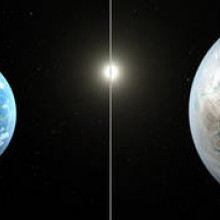
08:24 - Finding evidence of extraterrestrials
Finding evidence of extraterrestrials
with Professor Jim Al-Khalili, University of Surrey & editor of Aliens
When we're searching for life in our universe, what evidence are we looking for? 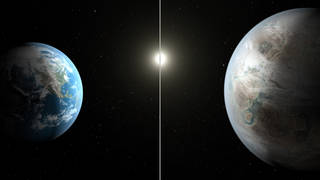 Jim Al-Khalili takes Graihagh Jackson on a journey through our universe...
Jim Al-Khalili takes Graihagh Jackson on a journey through our universe...
Jim - We have to be much more imaginative than assuming that if aliens exists then they are all sentient, intelligent, and look like us.
Graihagh - That's Jim Al Khalili - professor of physics and editor of the book Aliens...
Jim - What we're really looking for is any evidence that life exists, or did exist somewhere else other than Earth.
Graihagh - And what do you mean when you say you're "looking for evidence" - what is the evidence that might be out there?
Jim - Well, one way is point our radio telescopes to listen out for signals from space. After all, we've been broadcasting our presence into the universe ever since we invented radio and television a hundred years ago. So, whether it's an accidental or deliberate signal from any alien civilisation, we're listening out for those signals. So this is what SETI, the Search for Extraterrestrial Intelligence is all about, but that is looking at life that is advanced enough to become technologically able to send out signals.
Graihagh - But what if you're not technologically able to send out signals - what if you've akin to a dolphin or a microbe?
Jim - Of course, there's also another strand which is looking for the signatures of life elsewhere in planets, in other star systems - extrasolar planets they're called. And we hear in the news now, in the scientific news almost weekly of a discovery of another so-called Earth-like planet.
Graihagh - In fact, do you remember Carol Haswell?
Carol - I'm an astrophysicist at the Open University where I do research on exoplanets.
Graihagh - She was on Naked Astronomy back in April talking about her love of exoplanets - planets around other stars or what Jim calls extrasolar planets - kinda a tomato / tomato scenario.
Anyway, a couple of months ago, she published a big paper in Nature, saying she'd found a habitable planet around our nearest star, Proxima Centauri. Scientists independent to the study described it as 'thrilling' because it's close enough for us to send our first interstellar spacecraft. Very exciting indeed. However, that doesn't mean we've FOUND life...
Jim - It means we've found another planet which we think could be like Earth. It might be at the right distance from it's star so that water can exist in liquid form, it might have an atmosphere and, therefore, it could, potentially, harbour life.
But what's really exciting now is that we have the ability to, just by studying the light coming from a star that could pass through the atmosphere of a planet going around that star, that light could carry with it a signature of molecules that could only have been created if life was there. So, certain types of organic molecules, or the presence of oxygen, or isotopes of carbon. There are certain chemicals that don't occur naturally that can only be created by living organisms.
Graihagh - That's pretty remarkable, isn't it? And I suppose the other thing that we should really talk about is Mars. Because there's been so much focus on trying to find out if there is any microbial life, or was, on Mars and I'm thinking especially of the very sad Exomars crash...
Jim - Yes, yes.
Graihagh - But I suppose we're using quite different techniques there as we are to looking at extrasolar planets?
Jim - That's right. With Mars we can actually send probes there and, if they land safely - Mars Rover is still busy - then they can look at soil samples and really, really study the composition there. We don't believe there's life on Mars now of any form, but there is a strong possibility that Mars did harbour life. Billions of years ago Mars was much more like Earth, it had an atmosphere, the climate was a bit more conducive to live, it was warmer. So life could have existed there and jury is still out on whether life existed there.
I do remember back in the 90s, there was a huge surge of excitement when it was thought that we'd found evidence of fossilised microbes in a meteorite that was discovered on Earth that we believe came from Mars. And studying it under an electron microscope it was thought that we could see this fossilised remains of a little organism, and that made headline news around the world. But then, of course, they realised that actually it was some inorganic crystalised structure that could have emerged without any evidence of life, so that was a huge disappointment.
Graihagh - We really are trying our darndest to find life somewhere, anywhere. Where is everybody - why are we not being successful in this given how much power and science we're throwing at it?
Jim - Yes. You've just quoted the famous Fermi paradox. Enrico Fermi, the Italian nuclear physicist was in Los Alamos in 1950 and he asked that question. That was just after there were lots of stories in the news coming out that people were seeing flying saucers landing and so there was a real buzz of excitement that whether aliens were visiting Earth. Said - "well okay, if the universe is so big, and it's been around for so long, and there's so many stars out there, where is everybody?" Is the fact that we've received nothing but complete silence for the last half century or more really evidence that we are alone and we should just give up hope?
But, actually, despite searching for so many decades, we are only sampling a tiny, tiny fraction of what is out there. After all, we are only looking towards star systems that are close enough to us - you know, hundred or so light years away or nearer. That's only our little neighborhood within the Milky Way galaxy. Just because we may never find evidence of life elsewhere doesn't mean there isn't life out there.
Just from the laws of probability, the universe is big enough that it must be teaming with life. It's just whether there's anything close enough to us that has evolved and become sentient, and developed civilisations, and developed technology enabling it to send signals out to us. So there are lots of steps along the way that would explain why we've heard nothing yet.

14:54 - How big is the Universe?
How big is the Universe?
with Professor Neil deGrasse Tyson, Hayden Planetarium & co-author of Welcome to the Universe
Neil deGrasse Tyson takes Graihagh Jackson on a journey through the universe  and questions what intelligence is...
and questions what intelligence is...
Graihagh - So half the problem is the the universe is a big place... but how big is big...
Neil - Astronomical.
Laughter.
You know that's our word - right? People have used that word to describe how big national debts have been or how large things are. But let me use it in the way it was intended, the way nature had always planned to use it - the universe is astronomically large - there's no other way to say it.
Graihagh - Meet Neil deGrasse Tyson.
Neil - An astrophysicist and co- author of Welcome to the Universe, and as my day job I serve as Director of New York City's Hayden Planetarium, which is part of the American Museum of Natural History.
Graihagh - I suppose it's kind of hard to wrap your head around, so how big is astronomical?
Neil - You raise an interesting philosophical point because when normally when we describe our life experiences, we compare them to other things that are of commensurate intensity, or size, or weight. You know you'd say "how big was that hailstone?" "Oh it was as big as a golf ball." So you would compare two things that already exist in your life experience. But since the size of the universe falls outside of our life experience, there's no easy corresponding thing to say "the universe is so big. It's as big as a..." See that's the end of the sentence. There's nothing you can add or bring to the cause.
So the way we try to do this is you try to build up from things that are familiar - how big the universe is, and you rapidly enter realms that are inaccessible. But you have a thread, however thin, that takes you back to something that you do recognise and that you do understand. And so that's how this basically works. I'll give you an example:
If you take a school room globe - a foot across maybe - and ask people "if this is the size of the Earth where would you put the Moon?" Like how far away is the Moon. People typically put it at most a metre away - okay. But, in fact, on that scale the Moon is ten metres away. Ten metres away from a globe that size. And how far away is Mars on that scale? Well, it is many kilometers away. And you start building and building and building. How big is the Sun compared to Earth? Well, if you hollowed out the Sun, you could pour more than a million Earths into the Sun and still have room left over.
Neil - So, oh my God, the Sun is huge. And so this is the kind of exercise you go through and that gives us some hope of grasping the sheer scale and size of things.
Graihagh - But that's only our solar system. We're talking about the whole universe here. So talking about understanding the universe, there's theories out there that suggest actually there may be many universes and, actually, we can only see a section of our universe. But, within our universe, how many galaxies are there, how many stars within those galaxies, planets?
Neil - So the observable universe contains approximately 100 billion galaxies, and a galaxy contains upward of a 100 billion stars. And planets, we have come to recognise, are quite common and when you put in some good estimates you get about 1.8 billion planets in the galaxy.
Graihagh - Not a small number then?
Neil - No, not a small number.
Graihagh - And we talk a lot about Drake's equation. This is trying to calculate how much life or intelligent life could be out there. You say 1.8 billion planets - what number of those could be what we would consider habitable?
Neil - Just because you're a planet doesn't mean there's life on them. And, by the way, this conversation could go both ways. Well, you could say you're not going to have life on all of those planets. Well, actually some planets have moons, and the moons themselves could have life, as an example. There are estimates ranging anywhere from one, which is just us, to I would say several hundred. Some cases of a few thousand but if you're going to be sort of middle of the road conservative, you'd say several hundred civilisations in the galaxy.
Graihagh - Where do you site on that spectrum youself? Are you a more conservative estimate or are you thinking there might be much more life out there?
Neil - I don't know that I'm actually on the spectrum. I'm a little bit off the spectrum. I have a slightly unorthodox view and it's: who is deciding that we humans are intelligent? Cause we're looking for other lifeforms like us, but who decided that we are intelligent? Well - we did, so we say we're intelligent. And the other life forms on Earth - no, just us, just us!
So I keep wondering, could there be lifeforms out there that are vastly more intelligent than we are on a level where they would not rate us as intelligent? Consider us not even interesting enough to put on their list of a civilisation worthy of their attention. I think about this all the time.
Graihagh - I mean, most people are wondering about what they're going to have for lunch you know.
Laughter
Graihagh - Ok, so if we loosen our definition of intelligence to include...
Neil - All big brained mammals right? Mammals are a branch of life that only really took a foothold by luck because the dinosaurs went extinct by an asteroid, so they had bad luck. But that pried open ecosystems enabling early mammals to take footholds in places where they previously just would have been h'orderves for the terrible lizards that we call dinosaurs. So the asteroids are bad for dinosaurs - good or mammals. So we rise up and now we are basically some of the most intelligent creatures on Earth. Rats and mice, and chimps and humans, and dolphins and whales, and the domesticated animals - dogs and cats. So if that branch never took hold then mammals would have never risen to what we now see. And that was only 65 million years ago out of a 3.5 billion year history of life on Earth.
So the contingency of the existence of our intelligence is something that is not clear would just duplicate in another planetary system, because it's not obvious that what you need to develop intelligence is as important for survival like other things like: can you run fast, do you have big teeth, can you hide, do you have camouflage. There are plenty of ways you can dominate your ecosystem and thrive that have nothing to do with what we think of as intelligence. So I don't see why most planets that have life would just have plenty of life just happily coming along, susceptible to the forces of natural selection and evolution of course, but without intelligence every arising up. I think there'll be plenty of such places are doing just fine in the galaxy and across the universe.
Now, if you do happen to develop intelligence, and you did it earlier ago than mammal intelligence developed on Earth, then maybe you've had a billion years to develop intelligence instead of our measly 65 million years from the branch of life called mammals. So, imagine a life form that's been developing intelligence far longer than ours. We could end up looking like no greater than worms slithering in the street in the presence of their intellect. I think about that all the time.
Graihagh - I have one final question for you and that is - if you ever got the chance to meet an alien, an extraterrestrial, what would you say?
Neil - Here's what I would do. I would show the alien - I'd assume they could see - and I would show the alien our periodic table of elements. I would find out how they count; they've got to be able to count. Once we learn how to count, once we learn about the elements, then we can do some rudimentary mathematics. Do they have representation for the value of Pi? Pi is very important mathematically and it's practically important. How do they present Pi? Then I compare my representations, our representations, with them? So you build a vocabulary from things we have in common.
I'm not teaching them English - that's not happening. And then I would ask how you have solved these various problems? I would ask for help because for sure human civilisation in 2016 needs help. Now I'd hope that they're benign and kind, because if we were they, we would come upon civilisation less advanced than we are and we would just round them up into reservations, or kill them, or enslave them. Like I said - put them in a zoo as research curiosities. So I would hope they don't treat us the way I know we would treat them.
Graihagh - More poignant points in Neil's book is out now - check it out, it's called "Welcome to the Universe".
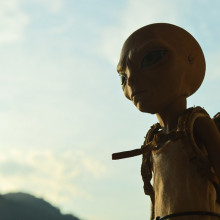
24:11 - What if we found aliens?
What if we found aliens?
with Professor Jim Al-Khalili, University of Surrey and editor of Aliens
What would it mean to discover we weren't alone in the universe? Jim Al-Khalili 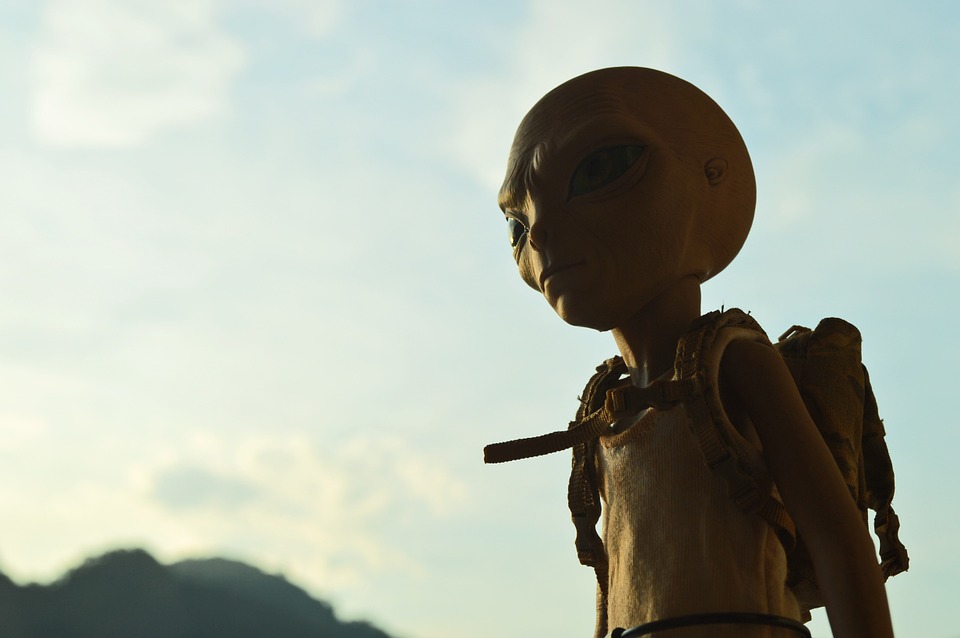 discusses the implications with Graihagh Jackson...
discusses the implications with Graihagh Jackson...
Jim - I use to think that it would render world religion obsolete, certainly those religions that their philosophy, ideology is about us humans being special and being created by a divine being that created us in his image. And all the stuff, for example, in the Abrahamic religions, is that all sort of thrown up in the air if we discovered we're not special? But I think, talking to other people, I'm now inclined to agree with them that religions are probably more versatile than I thought. They would roll with this punch in the same way that the more enlightened religions are quite happy to have acknowledged that the Earth isn't the centre of the universe post Copernicus and Galileo. So I think discovering life elsewhere won't do away with religions but it will certainly, I think, change our perception of our place in the universe in a far more profound way than I think people think now.
I just use as an example the false alarm back in the late 90s of the discovery of the fossilised microbe on Mars. Bill Clinton went out on the White House lawn and said "this will be the most significant discover in the history of mankind." Well, you know, I wouldn't disagree with him there, I think it would be profoundly important.
Graihagh - Umm, perhaps just let's not hold our breath.
Jim - We'll just get on with doing other things at the same time as well. Let's not just twiddle our thumbs. There's plenty else we can be doing as well.
Graihagh - Jim's put together a great book on this and more...
Jim - Well, essentially it's on the possibility of extraterrestrial life; is there other life out there? But aliens is a much catchier title. I've called upon friends and other that I didn't know but admired for afar because of their work, and we've covered every aspect of alien life, the possibility thereof that science can offer.
Graihagh - It's out now and called Aliens. Thanks to all my guests this week - Dallas Campbell, Jim Al Khalili and Neil DeGrasse Tyson.









Comments
Add a comment